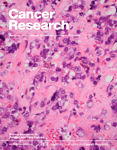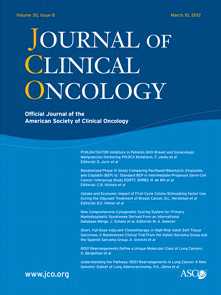Cancer Res.:乳腺癌与镉摄入量有关
2012-03-23 MedSci MedSci原创
瑞典卡罗林斯卡医学院3月15日对外发布该学院一项最新研究成果,这一研究显示,女性从食物中摄入的镉元素量与其患乳腺癌的风险正相关。 这项研究以瑞典近5.6万名女性参与的饮食习惯调查数据为样本,经分组比对发现,镉摄入量最高组的女性比摄入量最低组的女性患乳腺癌风险高21%。另外,食用全麦食品和蔬菜较多的女性患乳腺癌风险相对较低。 有关专家认为,动物肝脏、肾脏以及某些贝类海产品中镉元素含量相对较高。研
瑞典卡罗林斯卡医学院3月15日对外发布该学院一项最新研究成果,这一研究显示,女性从食物中摄入的镉元素量与其患乳腺癌的风险正相关。
这项研究以瑞典近5.6万名女性参与的饮食习惯调查数据为样本,经分组比对发现,镉摄入量最高组的女性比摄入量最低组的女性患乳腺癌风险高21%。另外,食用全麦食品和蔬菜较多的女性患乳腺癌风险相对较低。
有关专家认为,动物肝脏、肾脏以及某些贝类海产品中镉元素含量相对较高。研究人员表示,人们早已知道镉是有毒物质,在某些情况下具有致癌性,他们开展此项研究的目的在于探求从饮食中摄入的镉与乳腺癌是否相关。

doi:10.1158/0008-5472.CAN-11-0735
Dietary Cadmium Exposure and Risk of Postmenopausal Breast Cancer: A Population-Based Prospective Cohort Study
Bettina Julin, Alicja Wolk, Leif Bergkvist, Matteo Bottai, and Agneta Akesson
The ubiquitous food contaminant cadmium has features of an estrogen mimetic that may promote the development of estrogen-dependent malignancies, such as breast cancer. However, no prospective studies of cadmium exposure and breast cancer risk have been reported. We examined the association between dietary cadmium exposure (at baseline, 1987) and the risk of overall and estrogen receptor (ER)–defined (ER+ or ER?) breast cancer within a population-based prospective cohort of 55,987 postmenopausal women. During an average of 12.2 years of follow-up, 2,112 incident cases of invasive breast cancer were ascertained (1,626 ER+ and 290 ER). After adjusting for confounders, including consumption of whole grains and vegetables (which account for 40% of the dietary exposure, but also contain putative anticarcinogenic phytochemicals), dietary cadmium intake was positively associated with overall breast cancer tumors, comparing the highest tertile with the lowest [rate ratio (RR), 1.21; 95% confidence interval (CI), 1.07–1.36; Ptrend = 0.02]. Among lean and normal weight women, statistically significant associations were observed for all tumors (RR, 1.27; 95% CI, 1.07–1.50) and for ER+ tumors (RR, 1.25; 95% CI, 1.03–1.52) and similar, but not statistically significant associations were found for ER? tumors (RR, 1.22; 95% CI, 0.76–1.93). The risk of breast cancer increased with increasing cadmium exposure similarly within each tertile of whole grain/vegetable consumption and decreased with increasing consumption of whole grain/vegetables within each tertile of cadmium exposure (Pinteraction = 0.73). Overall, these results suggest a role for dietary cadmium in postmenopausal breast cancer development.
本网站所有内容来源注明为“梅斯医学”或“MedSci原创”的文字、图片和音视频资料,版权均属于梅斯医学所有。非经授权,任何媒体、网站或个人不得转载,授权转载时须注明来源为“梅斯医学”。其它来源的文章系转载文章,或“梅斯号”自媒体发布的文章,仅系出于传递更多信息之目的,本站仅负责审核内容合规,其内容不代表本站立场,本站不负责内容的准确性和版权。如果存在侵权、或不希望被转载的媒体或个人可与我们联系,我们将立即进行删除处理。
在此留言










#摄入量#
76
#Res.:#
54
#镉#
0